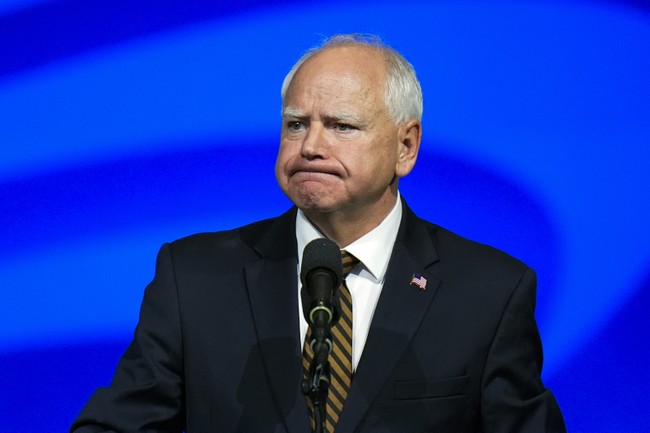Politico Magazine published a story yesterday titled “JD Vance Criticized Tim Walz’s Retirement. But There’s Something He Doesn’t Understand.” Okay, I thought, you’ve got me. I want to know what JD Vance doesn’t understand about Tim Walz service and his decision to leave just as his unit was deploying to Iraq.
The author of this piece is a journalist who has spent 6 years in the National Guard and it’s pretty clear the pitch for this article was that he had some inside knowledge that most people did not. But after reading this I’m not sure what that is.
Few can grasp the choice that Walz faced — including Vance, whose life revolved around the Corps during his enlistment.
But I do. I have missed birthdays, anniversaries and career opportunities. I have also gained things that words can’t capture by serving my country during its times of greatest need. Yet for every ball I keep in the air, another hits the ground. I was laid off from my reporting job in July while on military leave.
Yes, people who serve miss things. I think we all get that. It’s not all upside which is why it’s service and not a job that everyone is clamoring to take. But Walz did it for 24 years. He clearly must have made peace with that bargain somewhere along the way. If it was too much for him, Walz could have quit when he reached 20 years. He didn’t have to keep going but he chose to do so. So, again, the idea that service involves sacrifices doesn’t really tell us anything about this particular situation.
The question at hand is a lot more specific. Why choose to leave just as your unit is going into combat? As we’ve already seen, Walz definitely knew his unit might be going into combat before he resigned. Other people who were there say he knew about it months before he filed to run for office. Rather than face this squarely, the author of the Politico piece tries to fuzz it up a bit.
I cannot definitively say when Walz requested retirement (a routine process that sometimes requires a maddening amount of lead time — I’ve seen packets take several months to clear state HQ). Nor can I definitively say when he first knew for certain that his men were bound for Iraq; an archived March 2005 release from Walz’s campaign indicated the matter was uncertain. Former colleagues claimed in recent TV interviews that Walz “knew,” if not officially, in late 2004. A National Guard press release said the 1st Brigade of the 34th Infantry Division (1-125 FA’s parent unit) received official deployment alert orders in July 2005.
Walz knew this was coming. He knew and other people in his unit knew that he knew. There’s no reason for confusion about the timeline here. And still we haven’t seen a good reason to excuse his retiring at that moment. Next the author tries to suggest it was his family life:
Beyond the military’s duties and his civilian career ambitions, Walz faced significant family demands when he hung up his boots. He and his wife Gwen struggled to conceive children naturally, so they spent seven grueling years pursuing in vitro fertilization, or IVF.
They had a daughter in 2001. Walz could have retired in 2001 when his daughter was born. He didn’t do that. He stayed in another four years, as we’ve already established. So I don’t think family life explains the timing of his resignation either. What else have you got?
…perhaps most salient to Walz, his troops and his fellow leaders was concern over whether he could continue leading soldiers while running for Congress on a platform that openly questioned the war in which they were to fight…
Would a battalion commander prepping for a potential combat deployment want a command sergeant major who was seeking political office and denouncing the war? Would the soldiers on the line question the motivations of a leader who actively, publicly and diametrically opposed the administration exercising lawful civilian control over their unit? How would the men with stars on their collars feel about the liberal political upstart from southern Minnesota?
Walz was an anti-war progressive. That’s the not-so-hidden secret here this has all been leading up to. This is supposed to make us sympathetic to Walz decision to bail on his unit. In fact, the author suggests they were better off without him. He may even be right about that.
But really this just confirms what most of us intuitively understood. Walz didn’t want to go to Iraq so he came up with a reason to excuse himself and went over the head of his supervisor to get out in the nick of time. The moment it became clear a combat deployment was coming, he was gone. He has spent the last 19 years talking up his service, insinuating he served in combat and overstating his retired rank.
Clearly this worked out well for him. Not only did he not have to spend 22 months in Iraq like the rest of his unit, he’s now a VP contender. But members of his unit who are unhappy with his actions have reason to be. When the going got tough they served while Walz bailed. And yet everyone in the media seemingly wants to portray him as the hero of this story.
Read the full article here









![CNN Panel Grapples with Public Indifference to J6 Storyline [WATCH] CNN Panel Grapples with Public Indifference to J6 Storyline [WATCH]](https://www.lifezette.com/wp-content/uploads/2024/11/2024.11.22-07.48-lifezette-6740e014aad9c.jpg)